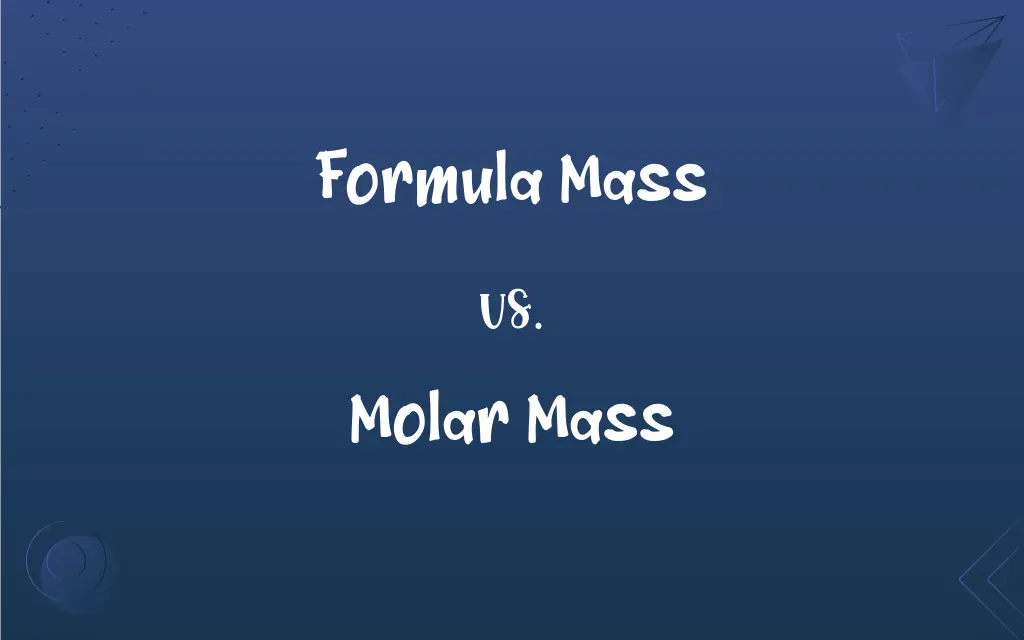Formula Mass vs. Molar Mass: What's the Difference?
Edited by Aimie Carlson || By Harlon Moss || Published on December 19, 2023
Formula mass is the sum of atomic masses in a chemical formula, while molar mass is the mass of one mole of a substance in grams.

Key Differences
Formula mass refers to the calculated mass of an individual molecule or formula unit, based on the atomic masses of its constituent atoms. Molar mass, on the other hand, is the mass of one mole of a substance, representing the mass of Avogadro's number of molecules or formula units.
The formula mass is expressed in atomic mass units (amu), and it reflects the sum of all atomic masses in a chemical formula. Molar mass is expressed in grams per mole (g/mol), and it quantifies how much one mole of a substance weighs.
To calculate formula mass, atomic masses from the periodic table are summed according to the formula's stoichiometry. In calculating molar mass, the formula mass is used as the basis, but the unit is converted to grams per mole.
The concept of formula mass is crucial in understanding the composition of molecules and compounds. Molar mass is essential for converting between moles and grams in chemical reactions and stoichiometry.
Formula mass is specific to the molecular or empirical formula of a compound. Molar mass, while derived from the formula mass, is a broader concept used in various calculations in chemistry.
ADVERTISEMENT
Comparison Chart
Unit of Measurement
Atomic mass units (amu)
Grams per mole (g/mol)
Basis
Sum of atomic masses in a formula
Mass of one mole of a substance
Application
Used to determine the mass of a single molecule
Used for mole-to-gram conversions and vice versa
Relevance
Crucial for molecular composition analysis
Essential for stoichiometric calculations in chemistry
Calculation Method
Summation of atomic weights from the periodic table
Formula mass converted to g/mol
ADVERTISEMENT
Formula Mass and Molar Mass Definitions
Formula Mass
The mass of a single molecule or formula unit.
The formula mass of carbon dioxide (CO2) is about 44 amu.
Molar Mass
A measure of how much one mole of a compound weighs.
The molar mass of carbon dioxide (CO2) is 44 g/mol.
Formula Mass
The sum of the atomic masses of all atoms in a chemical formula.
The formula mass of water (H2O) is approximately 18 amu.
Molar Mass
The mass of one mole of a substance in grams.
The molar mass of oxygen (O2) is 32 g/mol.
Formula Mass
The calculated mass of a compound based on its chemical formula.
The formula mass of sodium chloride (NaCl) is 58.5 amu.
Molar Mass
The weight of Avogadro's number of molecules of a substance.
The molar mass of glucose (C6H12O6) is about 180 g/mol.
Formula Mass
A measure of the total atomic mass in a compound's formula.
Glucose (C6H12O6) has a formula mass of around 180 amu.
Molar Mass
The molecular or formula weight expressed in grams per mole.
The molar mass of water (H2O) is approximately 18 g/mol.
Formula Mass
A representation of the molecular weight in atomic mass units.
The formula mass of ammonia (NH3) is 17 amu.
Molar Mass
A conversion factor for relating moles of a substance to its mass.
The molar mass of sodium chloride (NaCl) is 58.5 g/mol.
FAQs
What unit is molar mass expressed in?
Molar mass is expressed in grams per mole (g/mol).
What is molar mass?
Molar mass is the mass of one mole of a substance in grams.
Is formula mass the same for all molecules of a compound?
Yes, the formula mass is consistent for all molecules of a specific compound.
How is formula mass calculated?
It's calculated by summing the atomic masses of each atom in the compound's formula.
How does molar mass relate to stoichiometry?
Molar mass is used to convert between moles and grams in stoichiometric calculations.
Is the formula mass always a whole number?
Not necessarily, as it can include fractional atomic masses.
What is formula mass?
Formula mass is the sum of the atomic masses of all atoms in a molecule's formula.
What role does molar mass play in chemical reactions?
It's crucial for measuring and reacting correct amounts of reactants and products.
Can molar mass vary between samples of the same compound?
No, the molar mass is a constant value for any given compound.
How do you find the formula mass of a complex molecule?
Add up the atomic masses of all atoms in the molecule's formula.
Why is formula mass important in chemistry?
It helps understand the composition and proportions of elements in a compound.
Is molar mass used in physical chemistry?
Yes, it's widely used in various physical chemistry applications.
Can molar mass be used in gas law calculations?
Yes, it's essential in calculations involving the Ideal Gas Law.
What's the main difference between formula mass and molar mass?
Formula mass is the mass of a single molecule in amu, while molar mass is the mass of a mole of molecules in grams.
Can formula mass be used to determine molecular geometry?
No, formula mass doesn't provide information on molecular geometry.
What's the difference between molecular mass and formula mass?
Molecular mass is the mass of a single molecule, similar to formula mass, but often used in the context of molecular compounds.
Does the formula mass change with physical state?
No, formula mass is constant regardless of the physical state of a compound.
Can molar mass affect the properties of a substance?
While molar mass itself doesn't affect properties, it's used to calculate properties like density.
How is molar mass helpful in lab experiments?
It aids in preparing solutions and calculating yields.
Is formula mass relevant in biological chemistry?
Yes, particularly in understanding and manipulating biochemical molecules.
About Author
Written by
Harlon MossHarlon is a seasoned quality moderator and accomplished content writer for Difference Wiki. An alumnus of the prestigious University of California, he earned his degree in Computer Science. Leveraging his academic background, Harlon brings a meticulous and informed perspective to his work, ensuring content accuracy and excellence.
Edited by
Aimie CarlsonAimie Carlson, holding a master's degree in English literature, is a fervent English language enthusiast. She lends her writing talents to Difference Wiki, a prominent website that specializes in comparisons, offering readers insightful analyses that both captivate and inform.







































































